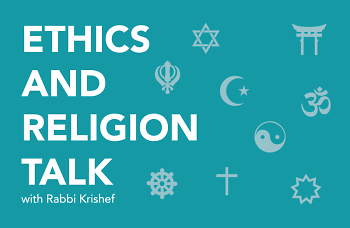Connor writes, “A word that often is used to describe religious teachings is ‘dogma.’ It's interesting that I tend to hear this word used in a pejorative sense so much of the time, as when someone is described as being ‘too dogmatic.’ I would appreciate learning what your clergy members think of the word, and if it describes their religion.”
Fred Stella, the Pracharak (Outreach Minister) for the West Michigan Hindu Temple, responds:
“So often I hear the words ‘dogma’ and ‘doctrine’ used interchangeably. This is not correct. A doctrine is a teaching. For instance, Hinduism holds the doctrine of rebirth. Yet it is not a dogma, because it is not a required belief. While there are many common understandings and convictions among Hindus, not one is a nonnegotiable that would in any way excommunicate someone who wished to identify as Hindu. We have been accused of allowing devotees to ‘believe what the want to believe.’ That is not true. We simply encourage our adherents to believe what they are able to believe. Anything beyond that is considered hypocrisy.
“All this said, I wouldn’t want to give the impression that there is any lack of dogmatic Hindus. They do exist. And I would so love for them to convert to something else.”
The Rev. Steven Manskar, pastor of Trinity United Methodist Church in Grand Rapids, responds:
“Dogma is ‘a fixed, especially religious, belief or set of beliefs.’ Our dogma is contained in The Articles of Religion of the Methodist Church and the Confession of Faith of the Evangelical United Brethren Church. These teachings are derived from Scripture, church tradition, and reason. They are the foundational teachings of every United Methodist congregation.
“We live in a culture that regards dogma of any kind with suspicion. The notion of ‘truth’ is subjective. Universal truth is rejected altogether. Therefore, it’s not surprising that dogma is commonly viewed pejoratively.
“Christians, and the church, are responsible for this when doctrine is preached and practiced in ways contrary to love. Dogma is intended to reveal the person and work of God who is Love (see 1 John 4:16). Many people who question or reject the church’s teachings have experienced them as abuse. Their hearts and souls have been harmed by persons who use the church’s doctrines to shame, punish and exclude.”
Linda Knieriemen, Senior Pastor at First Presbyterian Church in Holland, responds:
“ ‘Dogma’ is language neither my denomination nor I use to describe religious teachings. The Presbyterian Church (USA) has established core beliefs and tenets of faith found in our Book of Confessions but these may be and have been questioned, clarified and sometimes altered to reflect new understandings and cultural contexts. Our members are not required to ‘sign on the bottom line’, subscribing to each belief, but are rather use these documents as a guide, a starting place, a help in understanding the Bible which is a higher authority than any human derived doctrine. Church leaders are held to a higher standard Those standards have changed over the years, for example, permitting women to be pastors and admitting non-church members to receive Holy Communion and welcoming LGBTQ into our communities of faith.”
The Reverend Colleen Squires, minister at All Souls Community Church of West Michigan, a Unitarian Universalist Congregation, responds:
“Unitarian Universalists do not assert a particular creed or support a specific dogma. We do have Seven Principles that are meant to guide us. Our 4th Principle: A Free and Responsible Search for Truth and Meaning speaks to our understanding regarding our beliefs. Each individual is encouraged to revisit and re-evaluate our beliefs over the course of our lifetime. We realize life experiences can alter our beliefs as we are challenged and inspired during our lifespan. We are often referred to as the church of free-thinkers.”
Rev. Ray Lanning, a retired minister of the Reformed Presbyterian Church of North America, responds:
“Presbyterianism has little place for the notion of dogma, because historically, it denoted any teaching or practice proclaimed or enforced by human authorities in church or state. The teaching was held for truth because these authorities said it was true; the practice was followed because they demanded compliance. The most dogmatic system in modern times was the militant, statist atheism and communism decreed and enforced by the Soviet Union in the name of Marxism and Leninism, and by the People’s Republic of China as Maoism.
“By contrast, Reformed and Presbyterian Christians confess ‘the sufficiency of the Holy Scriptures to be the only rule of faith’ (Belgic Confession, Article 7). Furthermore, ‘God alone is Lord of the conscience, and hath left it free from the doctrines and commandments of men which are in any way contrary to His Word; or beside it, in matters of faith or worship’ (Westminster Confession, Ch. XX, Sec. II). We commend our faith, order, and worship to the world at large because these are the doctrines God teaches in Holy Scripture, and the practices commanded by our Lord Jesus Christ.”
This column answers questions of Ethics and Religion by submitting them to a multi-faith panel of spiritual leaders in the Grand Rapids area. We’d love to hear about the ordinary ethical questions that come up in the course of your day as well as any questions of religion that you’ve wondered about. Tell us how you resolved an ethical dilemma and see how members of the Ethics and Religion Talk panel would have handled the same situation. Please send your questions to [email protected].
The Rapidian, a program of the 501(c)3 nonprofit Community Media Center, relies on the community’s support to help cover the cost of training reporters and publishing content.
We need your help.
If each of our readers and content creators who values this community platform help support its creation and maintenance, The Rapidian can continue to educate and facilitate a conversation around issues for years to come.
Please support The Rapidian and make a contribution today.
